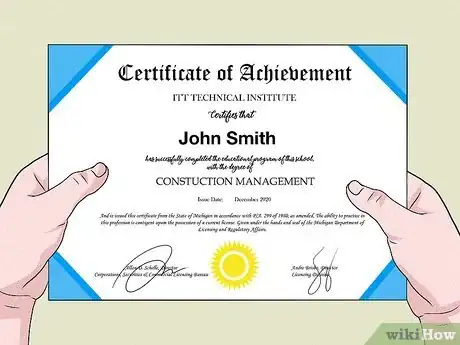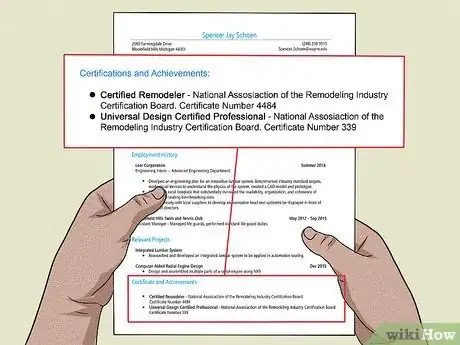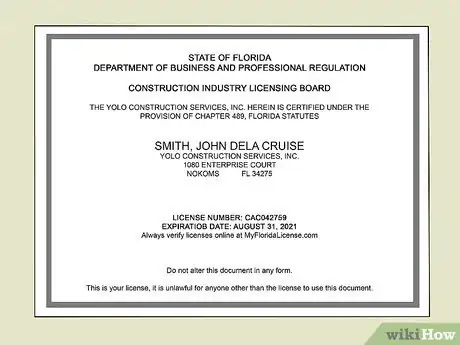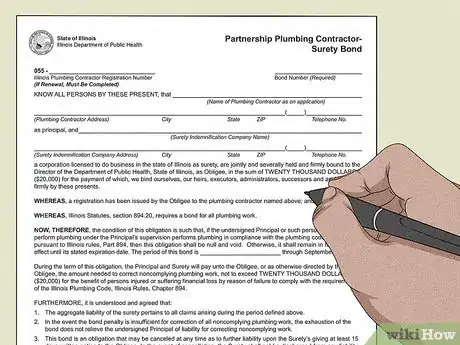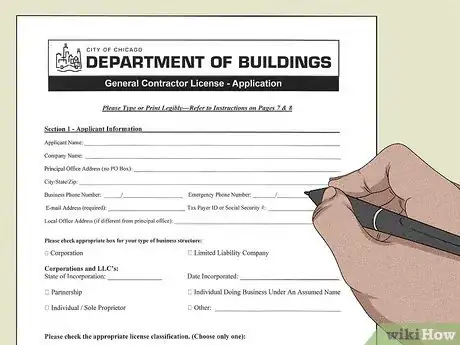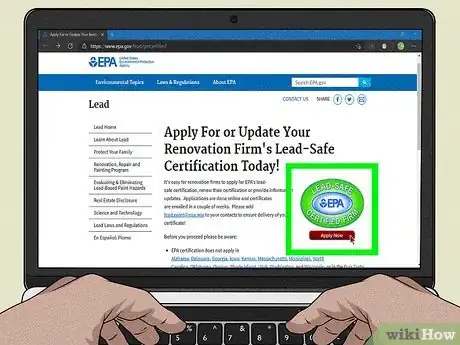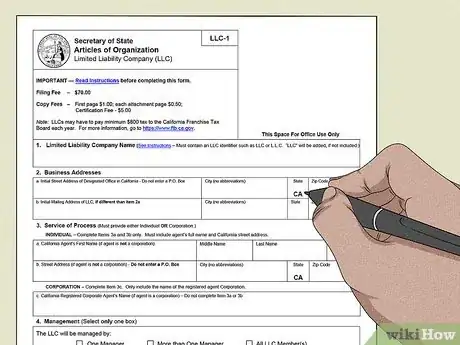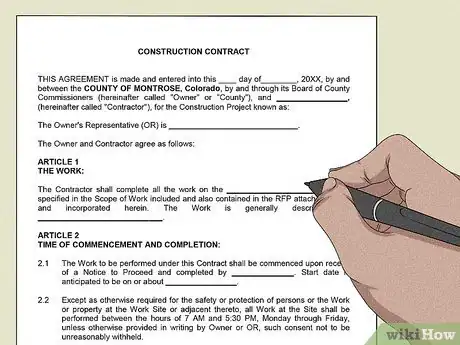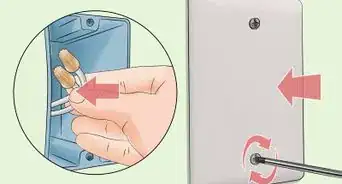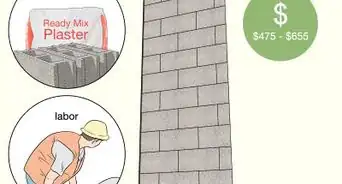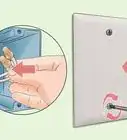This article was co-authored by GreatBuildz and by wikiHow staff writer, Hannah Madden. GreatBuildz is a free service that matches homeowners with reliable, pre-screened general contractors. GreatBuildz was founded by a team of real estate and construction experts who believe everyone deserves to find a great contractor, have a stress-free renovation, and enjoy their beautiful new space. GreatBuildz connects homeowners with reputable contractors who passed their rigorous screening process and signed their code of conduct. GreatBuildz also individually selects contractors for the specific project and provides ongoing support to ensure everything goes smoothly.
There are 13 references cited in this article, which can be found at the bottom of the page.
This article has been viewed 95,091 times.
If you like doing jobs around the house, you might consider becoming a home improvement contractor. Contractors like these do jobs for individual clients on either a large or a small scale; you could do the jobs yourself or oversee a team of contractors doing the work. A career as a home improvement contractor can grant you the flexibility and autonomy of owning your own business while allowing you to work with your hands and take pride in your handiwork.
Steps
Experience and Education
-
1Get experience in residential construction. Try to find an entry-level job in general contracting, construction, or home improvement. Then, work your way up through positions to gain skills in every area of the home. Focus on plumbing, carpentry, electricity, and flooring.[1]
- Your experience is especially important if you don’t want to pursue further education.
- You could apply for a low-level construction job to start with (even a seasonal one is great). As you get more skills and qualifications, you can move up the ranks and get more experience in other areas.
-
2Gain skills like supervising, client-relations, and budgeting. If you’re planning to oversee large-scale projects, make sure you have experience in coordinating jobs with others. Try to get leadership experience, talk to clients about jobs, and work on creating budgets and timelines for job sites.[2]
- You can get this working at a construction site or doing jobs for a general contractor.
Advertisement -
3Try getting a formal education to fast track your job. Construction Science, Construction Management, Construction Engineering, or Architecture are all valuable degrees for this job. Or, look for programs through the American Council for Construction Education or the American Institute of Constructors.[3]
- A lot of community colleges have 1 to 2 year programs for trade workers.
- You could also take classes in business and administration as well. These will help you if/when you start your own contracting business.
-
4Boost your resumé with a certification from NARI or OSHA. To get a National Association of the Remodeling Industry, or NARI, certification, take a 200-question test on codes, laws, safety standards, and industry-specific skills.[4] To get certified through the Occupational Safety and Health Administration, or OSHA, take 10 to 30 hours of in-person safety training.[5]
- You’ll have to update your certification periodically (usually every 5 years or so), so keep good records of when you got certified.
Licenses and Insurance
-
1Get a business license if your state requires it. Every state is different, but most jurisdictions require contractors to have a business license before they start working. You can get one through the licensing board of your state, city, or county, depending on where you live. Create a business plan, come up with a business name, and register your business to get a license.[6]
- You may have to take an exam to prove your knowledge on construction and business law.
-
2Register for a bond to protect your customers. Bonds are promises from a bonding company (usually the state you work in) to pay your customers if you fail to complete your work. You can apply for a bond by filling out an online registration form through your state or jurisdiction.[7]
- Many customers won’t hire a contractor unless they’re bonded, so it’s a good idea to do this as soon as possible.
- The amount of the bond varies from state to state. Generally, home improvement contractors have to take out a bond for $10,000 to $20,000.
-
3Apply for a contractor’s license if your state requires it. Usually, a state or jurisdiction will require either a business license or a contractor’s license.[8] You will need to take an exam and take a fee to qualify for this license.[9]
- You’ll also have to renew your license periodically (usually every 3 to 5 years).
- Fees for a contractor’s license vary, but they’re usually between $150 and $200.
- This could also be called a “Home Improvement License.”
-
4Get a lead certification if you’re working on old homes. Homes built before 1978 may have lead paint on the walls or ceilings. If you plan on working in older homes or buildings, apply for the Environmental Protection Agency’s (EPA) Lead-Safe Certification. Some states require you to have this before you start contracting.[10]
- You can apply for this certification by visiting https://www.epa.gov/lead/getcertified.
-
5Purchase insurance to protect your business. Look for personal liability insurance, property damage insurance, and worker’s compensation (contractors need all three).[11] You can shop around to find the lowest insurance rates near you, but they usually cost around $90 per month in total.[12]
- Most clients will ask about your insurance policies, so make sure yours are updated.
-
6Create a small business with an LLC. If you’d like to turn your contracting jobs into an actual registered business, you’ll need to apply for a limited liability company, or an LLC. This will protect your business and cover accidents with insurance. Usually, you can register with your state online by filling out a form with your business name, address, and the members/owner.[13]
- The other option is filing taxes as an independent contractor. This will be less money up front, but it doesn’t offer the same protections as an LLC does.
Business Management
-
1Market your business online and in local papers. When you’re first starting out, you can advertise your services locally. Start by taking out ads in your local papers or magazines, then create a website for your business so people can look you up.[14]
- Having a social media presence is a great (and free) way to advertise. Start a business page on Facebook or Instagram to get new clients that way.
- Keep your website updated with pictures of job sites or completed work.
-
2Get new clients via word-of-mouth. Recommendations from friends or family members go a long way. Ask your clients to tell people they know about your services and recommend you for any home improvement jobs.[15] [16]
- This is a great way for clients to see your work before they actually talk to you. That way, they can get a feel for what kind of services you offer.
-
3Join an industry association for networking opportunities. Talking to other contractors is a great way to find more jobs in your area. Look for an industry association near you, like the Associated General Contractors.[17]
- There are also hyper-specific associations you can join, like the International Risk Management Institute (IRMI) or the National Association of Women in Construction (NAWIC).
-
4Write up a contract for every client. It’s important to get every job in writing before you start. Give your client an estimate, then write them a contract with payment options and a timeline.[18]
- This is to protect both you and your client. If anything goes wrong, you can take your contract to court.
- You can also put your bond, license, and insurance information in the contract.
-
5Oversee jobs, apply for permits, and work with clients. On a daily basis, you’ll most likely be checking in with your job sites and making sure everything is running smoothly. You may have to apply for residential permits through your city before starting jobs, and you can also do physical labor yourself if you’d like to.[19] [20]
- Most large remodels require permits, like adding rooms or building outside enclosures. Smaller jobs, like flooring or kitchen remodels, generally don’t require permits.
- Communication is key to being a good contractor. Make sure that you're transparent and open with your clients throughout the projects.[21]
Community Q&A
-
QuestionWhat is the organizational structure of a home improvement company? I.e, Do I need a board of directors, president, vice president, etc.?
 Community AnswerAs with any business, there are many options, including corporation, LLC, partnership, or sole proprietor. The structure you choose should reflect what's best suited to your particular situation. You should seek legal or professional advice before making this decision.
Community AnswerAs with any business, there are many options, including corporation, LLC, partnership, or sole proprietor. The structure you choose should reflect what's best suited to your particular situation. You should seek legal or professional advice before making this decision.
References
- ↑ https://www.bls.gov/iag/tgs/iag238.htm
- ↑ https://www.bls.gov/iag/tgs/iag238.htm
- ↑ https://www.acce-hq.org/about-industry
- ↑ https://www.nari.org/Certification-Accreditation/Certification/cert
- ↑ https://www.osha.com/faqs/
- ↑ https://www.michigan.gov/documents/lara/builders_licensing_guide_511756_7.pdf
- ↑ https://www.oregon.gov/ccb/licensing/pages/suretybonds.aspx
- ↑ GreatBuildz. Contractor Matching Service. Expert Interview. 25 November 2020.
- ↑ https://247mass.com/2018/01/25/everything-need-know-massachusetts-contractor-licensing/
- ↑ https://www.epa.gov/lead/getcertified
- ↑ GreatBuildz. Contractor Matching Service. Expert Interview. 25 November 2020.
- ↑ https://www.consumer.ftc.gov/articles/0242-hiring-contractor
- ↑ https://www.hg.org/legal-articles/independent-contractors-should-they-form-an-llc-or-s-corp-50404
- ↑ https://www.entrepreneur.com/article/285633
- ↑ https://www.consumer.ftc.gov/articles/0242-hiring-contractor
- ↑ GreatBuildz. Contractor Matching Service. Expert Interview. 25 November 2020.
- ↑ https://www.cfma.org/resources/content.cfm?ItemNumber=958
- ↑ https://www.consumer.ftc.gov/articles/0242-hiring-contractor
- ↑ https://www.consumer.ftc.gov/articles/0242-hiring-contractor
- ↑ GreatBuildz. Contractor Matching Service. Expert Interview. 25 November 2020.
- ↑ GreatBuildz. Contractor Matching Service. Expert Interview. 25 November 2020.


